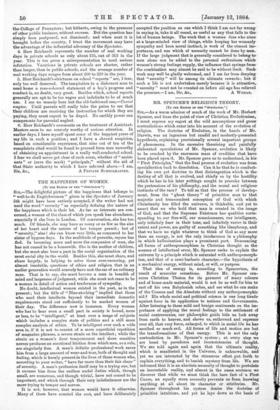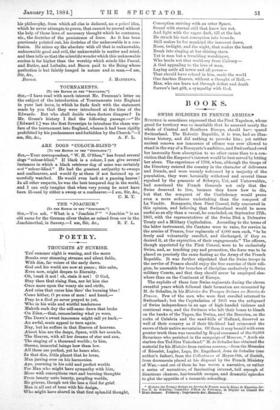MR. SPENCER'S RELIGIOUS THEORY.
[TO IRE Burros or THE " Brscrkroa."]
Sra,—As a warm admirer of much of the work of Mr. Herbert Spencer, and from the point of view of Christian Evolutionism, I must express my regret at the wild assumptions and gross contradictions which enter into his account of the evolution of religion. The doctrine of Evolution, in the hands of Mr. Darwin, was an ingenious but candid and modestly-presented;
hypothesis, explaining provisionally several important groups- of phenomena. In the excessive theorising and painfully elaborated speculations of Mr. Spencer, evolution is likely to be crushed by the enormous mass of crudities that have been placed upon it. Mr. Spencer gave us to understand, in his " First Principles," that the final process of evolution was from specialisation back to dissolution. Can it be that he is conduct- ing his own pet doctrine to that disintegration which is the destiny of all that is evolved, and chiefly so by the hostility which he has in his later writings sought to provoke between. the pretensions of his philosophy,, and the moral and religions" instincts of the race P To tell us that the process of develop- ment, from the "ghost theory" of primitive man to that majestic and transcendent conception of God with which Christianity has filled the universe, is thinkable, and yet to. assert that we who hold that man is created in the image- of God, and that the Supreme Existence has qualities corre- sponding to, our free-will, our consciousness, our intelligence,. only infinitely finer in their tone, and infinitely vaster in their extent and power, are guilty of something like blasphemy, and that we have no right whatever to think of God as any more than an energy, is not the only incoherence in a philosophy in which hallucination plays a prominent part. Denouncing all forms of anthropomorphism in Christian thought as the essence of intellectual error, Mr. Spencer seeks to explain the- universe by a principle which is saturated with anthropomorph- ism, and that of a semi-barbaric character,—the hypothesis of a mechanical energy, without mind, or will, or purpose.
That idea of energy is, according to Spencerism, the result of muscular sensations. Before Mr. Spencer cen- sures Christian Theism for its garment of many colours and of home-made material, would it not be as well for him to cast off his own Babylonish robes, and see what he can make- of the Cosmos and the Absolute without any anthropomorphic aid P His whole social and political science is one long tirade- against force in its application to nations and Governments.. After listening to these mild and benign sentiments on the im- portance of applying the moral feelings to the settlement of social controversies, our philosophic guide bids us look away from earth to heaven, and shows us, enthroned and supreme over all, that very force, enlarged, to which in social life he has ascribed so much evil All forms of life and motion are but the transformations of that energy. This is not the only contradiction in Mr. Spencer's system ; at every step we are beset by paradoxes and inconsistencies of thought.. We are told again and again that the ultimate reality, which is manifested in the Universe, is unknowable, and yet we are interested by the strenuous effort put forth to explain everything, and to banish mystery from life. We are informed that it is an absolute .necessity of thought to postulate an inscrutable reality, and almost in the same sentence we discover that while we must think the bare fact of 'a First Cause, an equally stern necessity prevents us from knowing anything at all about its character or attributes. Mr. Spencer throughout his system denies the doctrine of primitive intuitions, and yet he lays down as the basis of his philosophy, from which all else is deduced, an a priori idea, which he never attempts to prove, that cannot be proved without the help of those laws of necessary thought which he contemns, viz., the doctrine of the persistence of force. As it has been previously pointed out, his doctrine of the unknowable is a con- fusion. He mixes up the absolute with all that is unknowable, unknowable good and evil, the unknowable in matter and mind, and then tells us that the scientific wonder which this unknowable excites is far higher than the worship which minds like Pascal, and Butler, and Leibnitz, and Bacon paid to the Being whose perfection is but faintly imaged in nature and in man.—I am, !Sir, &c.,







































 Previous page
Previous page